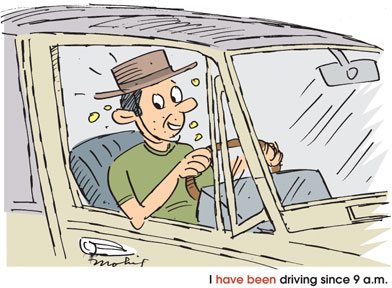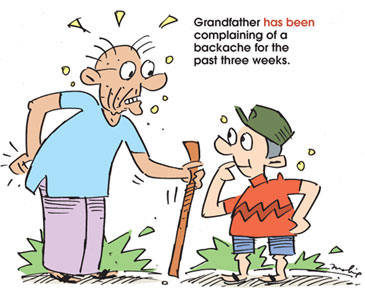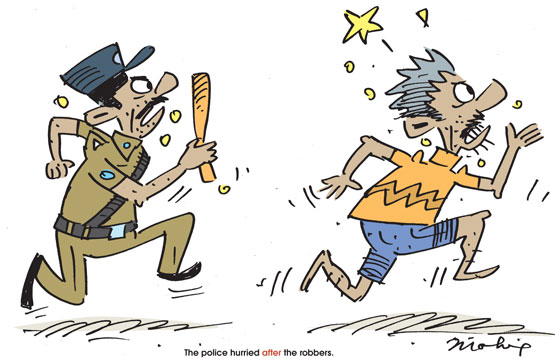|

by R. S. Karunaratne
Present Perfect continuous tense
 The present perfect continuous tense is formed in the following
manner: The present perfect continuous tense is formed in the following
manner:
Has / have + been + base form of the verb + 'ing'.
We use the present perfect continuous tense for an action which began
in the past and continues up to the point of speaking. The action may or
may not be finished.
I have been driving since 9 a.m.
Nethmi has been thinking about him.
Have you been waiting long?
I haven't been studying very well recently.
It has been raining all day.
We use the present perfect continuous tense to refer to a series of
repeated actions or situations that began in the past and continues to
the present.
Grandfather has been complaining of a backache for the past three
weeks.
The newspaper company has been publishing many new periodicals in the
past few months.
Jane has been working in Colombo since January.
It has been raining for the past few days.
Clients have been phoning me throughout the day.
[Activity]
Correct the following sentences and check your answers with the key.
1. It's raining since Christmas...........................
2. How long are you learning English?....................
3. I was playing a lot of tennis recently...................
4. I was living in the Regent Flats for the past five
years...............
5. The beggar was standing on the corner of the street all
day............
6. A: I hear you're working at Royal Gardens.
B: Yes, I'm working there for a month...................................
7. How long are you a doctor?........................................
8. The children are playing on the beach all
morning........................
9. The plumber was trying to seal the leak for more than an
hour............
10. The enemy planes were dropping bombs on the island all
night............
Key:
1. It has been raining since Christmas.
2. How long have you been learning English?
3. I have been playing a lot of tennis recently.
4. I have been living in the Regent Flats for the past five years.
5. The beggar has been standing on the corner of the street all day.
6. Yes, I have been working there for a month.
7. How long have you been a doctor?
8. The children have been playing on the beach all morning.
9. The plumber has been trying to seal the leak for more than an hour.
10. The enemy planes have been dropping bombs on the island all night.
Know your prefixes
[Part 3]
A prefix is a word part you place at the beginning of a word to
change its meaning.
The 'pre' in 'prefix' is itself a prefix. 'Pre' means 'before' or 'in
front of.' Today let's learn some more prefixes.
Ex
The prefix 'ex' usually means "out." When you express yourself, you
press your thoughts "out." When we use 'ex' with a hyphen, it shows a
person's former position.
Ex-president, ex-principal, ex-wife, ex-husband, ex-prime minister,
ex-chairman, ex- champion.
Com
The prefix 'com' means "with" or "together". We usually use 'com'
before words beginning with 'b, p' or 'm.'Compress, commingle, combat.
Before words beginning with 'L', we change the "com" prefix to 'Col.'
Collapse
Before words beginning with 'R', we change the "com" prefix to 'Cor':
correlate. Sometimes, we use the prefix 'Co': Cooperate, Copilot, The
"con" prefix appears very often: conform, contest, condense.
 Pre Pre
We use the 'pre' prefix meaning 'before' as in: prefix, prepaid.
Pro
The prefix 'pro' means 'onward': promote, progress, proceed
Sub
The prefix 'sub' means "under." Subordinate, sub inspector, sub
postmaster, submarine, sublease, suburban.
Super
The prefix 'super' means "over" or "superior," superhighway,
supernatural, superman, superstructure, supersonic.
Trans
The prefix 'trans' means 'across.' transatlantic, transport,
transform.
Inter
The prefix 'inter' means 'between,' interstate, international,
interact
Skill drill
Add the relevant prefixes to the following words. Check your answers
with the key.
Meaning
1. .... pose put back
2. .... pose place in full view
3. .... pose put together
4. .... pose put in
5. .... pose put for approval
6. .... pose put down
7. .... pose put away
8. .... pose place across
9. .... pose place under
10. .... tract draw back
11. .... tract pull out
12. .... tract draw together
13. .... tract draw onward
14. .... tract pull down
15. .... tract draw away
16. .... tract draw lower
17. .... cede go back
18. .... cede go with
19. .... cede go before
20. .... cede go between
21. .... ceed go out
22. .... ceed turn out well
23. .... ceed go onward
24. .... port carry back
25. .... port carry out
Key: 1. re 2. ex 3. com 4. im 5. pro 6. de 7. dis 8. trans 9. sup 10.
re 11. ex 12. con 13. pro 14. de 15. dis 16. sub 17. re 18. con 19. pre
20. inter 21. ex 22. suc 23. pro 24. re 25. ex.
Starters:
Use of prepositions
[Part 6]
There is a very small number of prepositions in comparison with the
vast number of nouns, adjectives and verbs used in English. Most
sentences we make contain at least one preposition. However, most
speakers and writers do not have a clear idea of how to use
prepositions.
[About]
When we write or talk about a particular thing, our words concern
that thing.
Let's talk about this problem at the next staff meeting.
Most soldiers do not worry about getting killed in the war.
A: Did you bring my notebook?
B: Sorry, I completely forgot about it.
I read a book about rebirth.
The Inland Revenue Department wants information about his income.
Some nouns are typically followed by about. Some of them are: advice,
agreement,anxiety, book, chat, complex, concern, consultation, joke,
debate, decision, fuss, idea, information, judgement, lecture, letter,
misgivings, misunderstanding, news, opinion, outcry, phobia, prediction,
quarrel, question, row.
Similarly, some adjectives are typically followed by about. Some of
them are: adamant, angry, annoyed, anxious, apprehensive, bothered,
certain, complacent, concerned, crazy, embarrassed, enthusiastic, fussy,
guilty, happy, ignorant, indignant, miserable, mistaken, nervous,
optimistic, passionate, pleased, positive, scathing, sceptical,
sensitive, sentimental, serious, sorry, uncertain, unclear, unconcerned,
undecided, uneasy, unhappy, unsure, upset, vague, wary, worried.
When we do something about an unsatisfactory situation, we try to
improve it.
 The Municipality should do something about the disposal of garbage. The Municipality should do something about the disposal of garbage.
The tap is leaking, do something about it.
I have failed in English. I must do something about it.
Why don't you do something about your stammering?
Let's do something about this problem.
If we move about a place, we go to several different parts of it.
I wandered about the city letting the time pass.
The principal was looking at the children running about the park.
[After]
If something happens after a time, it happens during the period of
time that follows that time.
Father returns home usually after midnight.
Let's talk about it after dinner.
The teacher left the class after a few minutes.
Jack returned home after serving a three-year prison term.
If somebody goes after a person, he follows him usually in an effort to
catch up with him.
The police hurried after the robbers.
Now a detective is after him.
If you ask after somebody, you ask for news about them.
Somebody asked after your friend Kolitha.
We use after between identical nouns.
Day after day, month after month, village after village
Forming verbs from nouns
A good knowledge of word families will help you to use the language
effectively. A list of nouns is given in column 'A'. Write the relevant
verbs in column 'B' and check your answers with the key.
[Column A] [Column B]
1. Variety ..................
2. Viewer ..................
3. Visitor ..................
4. Voter ..................
5. Warmth ..................
6. Washing ..................
7. Watch ..................
8. Water ..................
9. Weakness ..................
10. Wear ..................
11. Weight ..................
12. Welcome ..................
13. West ..................
14. White ..................
15. Width ..................
16. Winner ..................
17. Wiring ..................
18. Wonder ..................
19. Word ..................
20. Work ..................
21. Worry ..................
22. Writer ..................
Concluded
Next: Forming adjectives from nouns
Key:
1. vary
2. view
3. visit
4. vote
5. warm
6. wash
7. watch
8. water
9. weaken
10. wear
11. weigh
12.welcome
13.westernize
14. whiten
15. widen
16. win
17. write
18. wonder
19. word
20. work
21. worry
22. write |



